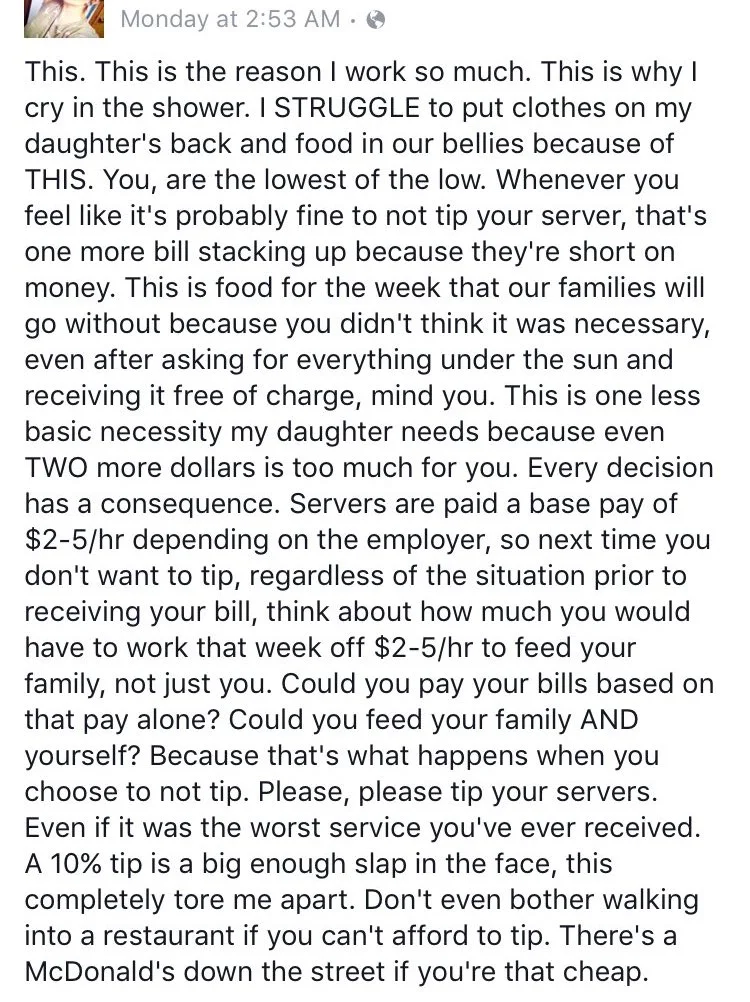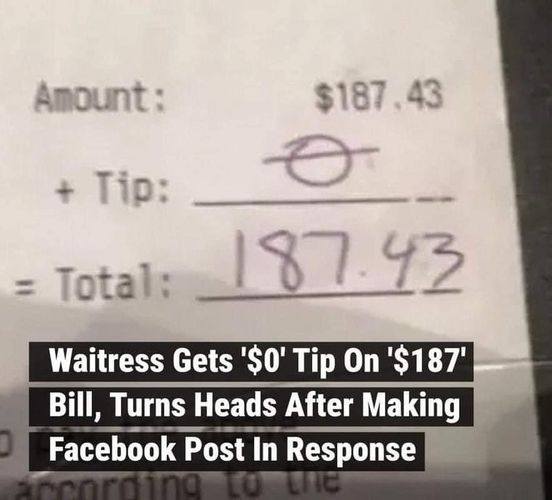Tipping is an integral part of the service industry, and yet it often goes unnoticed or overlooked. For one waitress in Colorado, a recent experience highlighted the challenges service workers face when customers neglect to tip. Taylar Cordova, a waitress at a local restaurant, took to social media to share her frustrations after receiving no tip on a $187.43 bill.
Cordova posted a photo of the receipt to her Facebook account, along with a message that resonated deeply with many. In her post, she expressed the financial difficulties servers endure when tips are not provided, particularly when customers choose to disregard the significance of gratuity.
As Cordova explained, the lack of tipping directly affects her ability to cover basic living expenses and provide for her family. While many may assume that restaurant workers earn a decent wage, the reality is often far from that. According to the U.S. Department of Labor, employers are only required to pay tipped employees a minimum of $2.13 per hour, provided that their tips make up the difference to reach the federal minimum wage. This wage structure, in place to support the tipping system, often leaves servers relying heavily on the generosity of customers to make ends meet.
In her post, Cordova addressed not only the specific individual who chose to leave no tip but also aimed to raise awareness about the widespread issue of poor tipping in the service industry. She emphasized that when customers fail to tip adequately, they make it even harder for servers, like herself, to survive and thrive in a job that already demands a great deal of hard work and patience.
Cordova’s message struck a chord with her followers, sparking a broader conversation about the responsibility of diners when dining out. Many commented on her post, expressing support for her stance on tipping and sharing their own experiences in the service industry. Her words were clear and straightforward: “Don’t even bother walking into a restaurant if you can’t afford to tip.”
The importance of this message became even more evident as her post went viral, gaining over 15,000 shares within hours. It served as a reminder that service workers—who often go above and beyond to ensure a positive dining experience—deserve to be compensated fairly for their efforts. In fact, proper tipping is not just a courtesy but a necessary part of the equation that helps servers make a living wage.
While many restaurants have attempted to address the issue by offering higher hourly wages or service charges, tipping remains a central aspect of the service industry, especially in states where tipped wages are allowed. Without the support of generous tips, servers like Taylar Cordova face an uphill battle to make ends meet, especially in areas with high living costs.
Cordova’s call to action was clear: dining out should be seen as a two-way transaction. While customers enjoy the food and service, they should also acknowledge the hard work that goes into delivering that experience. She pointed out that when people fail to leave a tip or leave an insufficient one, it undermines the value of service and the effort that goes into providing it.
Her post also highlighted the emotional toll that these situations can take. For servers, the job is not just about taking orders and delivering food—it’s about connecting with people, creating an atmosphere, and making customers feel welcome. It’s no easy task, and yet the lack of recognition for these efforts can leave workers feeling disrespected and undervalued.
As the social media shares continued to roll in, Cordova’s post sparked a wave of conversations about tipping, fairness, and the treatment of service workers. For many, it served as a reminder of the vital role that tips play in the livelihood of those who work in the hospitality industry.
In the end, Cordova’s message serves as a simple but powerful reminder: tipping is not optional—it’s a crucial part of the service industry that allows hardworking individuals to earn a fair wage. If you can’t afford to tip, consider whether dining out is the right choice, as your tip can mean the difference between a server struggling to make ends meet and feeling appreciated for their efforts. Let’s all be more mindful of the people who make our dining experiences enjoyable and remember that a little generosity can go a long way.

